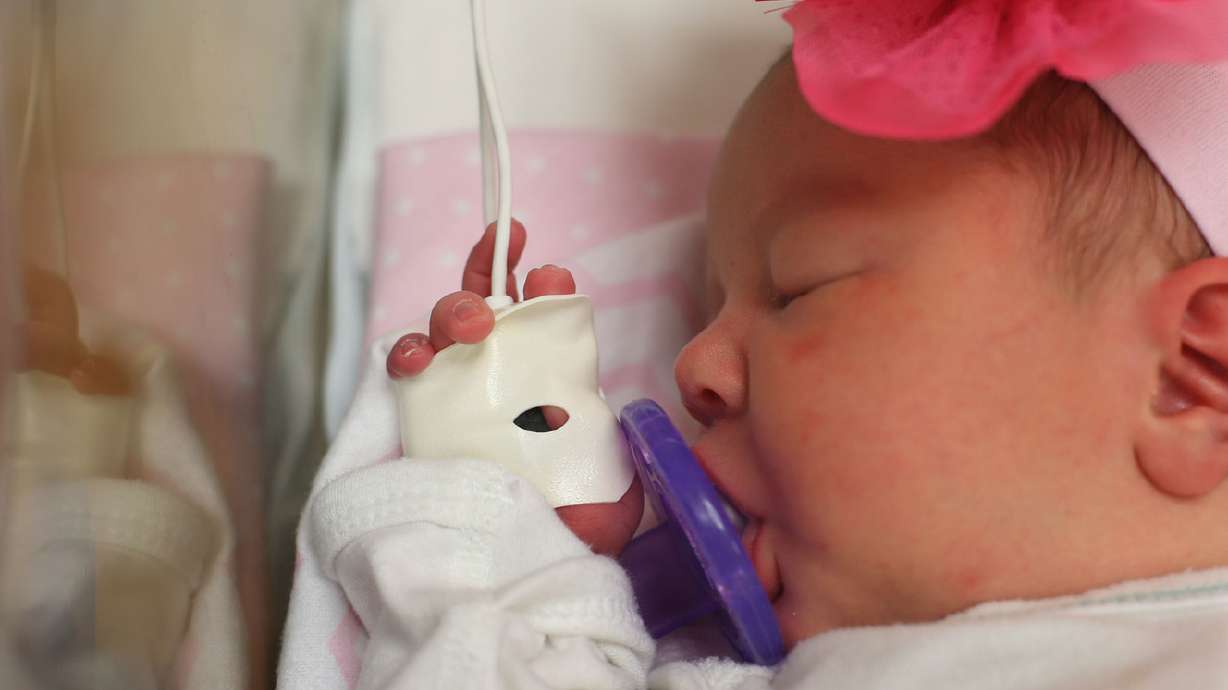Estimated read time: 4-5 minutes
This archived news story is available only for your personal, non-commercial use. Information in the story may be outdated or superseded by additional information. Reading or replaying the story in its archived form does not constitute a republication of the story.
MURRAY — Opal Chandler isn't yet aware that at 24 hours old, she's already passed some pretty serious tests.
The tiny baby, a third for parents David and Emily Chandler, was discharged Thursday in good health, alleviating most of the worries parents have in those first few months of a child's life.
While results for metabolic disease testing are pending on blood labs, Opal sailed through the infant hearing screening test and the critical congenital heart defect screening test, which, as of Wednesday, is required by law for all babies born in Utah.
"We're willing to have them looked at and prodded and poked to make sure they are OK and that they live happy and have the most successful lives possible," David Chandler said.
As he spoke from the family's room at Intermountain Medical Center on Thursday, baby Opal looked up at her dad with that sense of trust that all babies seem to have.
"We love her," he said. "She's much anticipated, and it's just good to have her here now."
If picked up later, there might be poor feedings at home and other failure-to-thrive type of things happening. It can lead to sudden infant death syndrome. Besides poor oxygenation, your whole body just doesn't respond.
–Margaret Anglesey Intermountain Medical Center
Within the first 24 hours of life, a baby's heart transforms from its prenatal stage, allowing it to pump its own blood throughout the baby's body. Occasionally, holes are left in the heart, which can lead to serious complications, even death.
To screen for the defects, a tiny light emitter is wrapped around a baby's right wrist and then a foot, measuring the oxygen saturation in the blood. The numbers tell the screener whether heart rhythms are consistent and whether the heart is pumping blood normally to all parts of the body, said Margaret Anglesey, a nurse educator at the Intermountain hospital.
"If picked up later, there might be poor feedings at home and other failure-to-thrive type of things happening," Anglesey said. "It can lead to sudden infant death syndrome. Besides poor oxygenation, your whole body just doesn't respond."
Successful screening results show numbers falling within the span of just two or three beats per minute at both limb locations.
While most congenital heart defects can be detected by ultrasound before a baby is born, the screening "is looking at children who, on the outside, look like healthy, happy newborns," said Amy Nance, a program manager with the Utah Department of Health's Birth Defects Network.
"If we can catch it early, there's a much better chance of saving these kids, rather than going home and possibly dying in the first few days of life if they don't get the treatment that they need," she said. "If these aren't treated early, they can result in developmental delays and also death."
Nance said the screening test used in Utah should detect any of at least seven of the more severe defects that require immediate treatment for the best and healthiest outcomes.
Congenital heart diseases cause up to 3 percent of all infant deaths in the first year of life, according to the U.S. Department of Health and Human Services.

Data from the Utah Birth Defect Network show that critical congenital heart defects occur in about 12 of every 10,000 babies born, or 1 in every 835 births in Utah. The state already conducts mandatory blood tests and hearing screenings on newborns.
"We're just trying to save these little babies," Nance said, adding that several Utah hospitals have been screening for the defects prior to the law taking effect.
The Utah Department of Health provided educational materials and training opportunities to birthing facilities throughout the state to help prepare for the Oct. 1 effective date for mandatory screenings. For more information, visit www.health.utah.gov/cchd.
The practice was first recommended by federal health officials in September 2011. Utah joins 38 other states where screening for critical congenital heart defects is required by law.
Intermountain Medical Center and University Hospital have been screening as part of a pilot project since 2013. Results have picked up critical congenital heart defects that went undetected before birth in at least two babies. Nance said the test has also helped detect other conditions in some babies, not related to heart defects.
The Chandlers' first child, Hinckley, ended up in the neonatal intensive-care unit when he was born, and tests have proven him well.
"How he's come out of it is fantastic," said David Chandler, adding that the experience gives him added assurances of hospital testing protocol.
He suspects Opal will take after her mother and older sister, Olive. But he has big plans for her happiness, as well.
"She is going to be a princess, like her mom and like her other sister before her," he said. "They are going to have kids of their own, go to college and hopefully marry decent people. She's going to be a great girl."
And thanks to the required testing, the entire Chandler family, including Opal, can breathe easy for a while — at least until the next hurdle of childhood comes along, which is probably just around the corner for the little gal, as she was headed home to "siblings who are pretty excited," Emily Chandler said.








